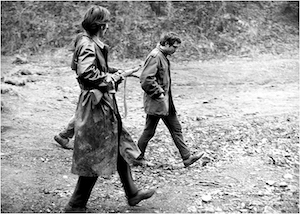
- This event has passed.
Dok Night | SYMBIOPSYCHO TAXICINEMA

Every Thursday there’s a Vegan Dinner accompanying an exhibition opening/closing, a live performance, live music, movie screening or …
Come meet other people interested in art and activism, good food and great prices. Bring your favourite game and your friends. Or meet new people at the bar.
***
18.00 Bar open
19.00 Vegan Food /// 2-course meal for 7 – 10 €
20:30
RANI RADOVI 1969
(Early Works)

After World War II the country of Yugoslavia was cut off from most of the world in many ways. They weren’t part of the Soviet bloc, having chosen to remain independent to create their own form of socialism, but they weren’t capitalist either and therefore were shunned by western countries. But on the other hand, that also left them alone to create their own culture… and since film production was promoted in the country, there are loads of cinematic gems made that are basically never shown here in the West.
In 1968 there were massive student demonstrations in Yugoslavia, and this movie is about the aftermath, as three men follow a Yugoslavian woman who refuses to give in and go back to a boring domestic life. The film proved to be a scandal, and after it was screened it went to trial, was charged with ‘harassment of the Yugoslavian people‘ and then banned. The director went into exile and lived abroad for years.
With this film Želimir Žilnik (Marble Ass) knocked out one of the most radical movies of the 1960s, and it is the only work from that era that still has multiple thick books written about it still today. In fact, I have three books on my shelf totally dedicated to this single film. In its homeland it has acquired a kind of almost mythical aura. Maybe because It has a stinging sharp critique, a wicked sense of black humour, a joie de la vie, and wasn’t afraid of being brutally honest. Also, it is seen by some even as a fundamental early feminist work.
Let’s be clear, Žilnik wasn’t interested in cinema as a distraction, or as entertainment. He was always aiming to tackle controversial social issues, but he refused to launch his attack in a standard, dull, pedantic, dogmatic way… he felt that imagination and creativity were necessary ingredients to both cinema in life. Today, the film is raw in a beautiful way, and it has an outrageously lively, jumpy, euphoric, visionary vibe. It won the Golden Bear at the 19th Berlin International Film Festival in 1969.
SYMBIOPSYCHOTAXICINEMA Presented by Jeffrey Badcock
A series of socially engaged movies, screened once a month on Thursdays. Touching on such hot topics as immigration, homelessness, racism, education, radical gender propositions, the pandemic and gentrification, these films not only explore visionary politics, but are also chosen to stir our imagination and creativity. The essence of cinema is the collective experience, and these screenings are aimed at creating intimate communities again in an increasingly hectic and fragmented world.
